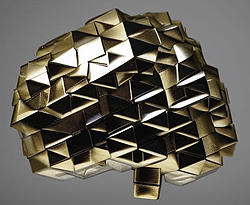Neuroscience For Kids
Metals in our Brains
By Ana Torres-Ocampo, Neuroscience for Kids Guest Writer
Edited by Ellen Kuwana
September 27, 2023
Did you know you need metals in your brain for it to work properly? Does this mean you need to find the nearest metal (spoon or fork) and lick it every day? Or go to the garage and find some wire and chew on it?
No! Although it is true that you need metals for normal brain function, you need metals only in tiny amounts ("trace" amounts). The amount of metal you need inside your body is so small that you can't see it with your eyes. Even with the most powerful microscope, you can't see the trace amounts of metals your brain needs to work right.
 You're probably asking: How does it work? Why do we need metals? How
do they get into the brain? And which metals are we talking about?
You're probably asking: How does it work? Why do we need metals? How
do they get into the brain? And which metals are we talking about?
How does it work?
As you may know, our bodies are made up of cells. These cells are organized into different tissues, eventually making up organs like your heart, liver and lungs. One of the most important organs we have is our brain. Our brains have their own special cells called neurons.
Scientists estimate that there are 86 billion neurons inside your skull. Like any other cell in your body, neurons have tasks (like jobs) to maintain health. Examples of jobs each neuron needs to do are:
- bring metals and other needed items into the cell
- produce energy
- make proteins that do specific jobs in the cell
- get rid of waste
Each cell (organized into organs) in your body has a special job. Neurons (organized into a brain) help with special jobs like learning and memory. These cells also send commands to tell your muscles to move. Without neurons, our senses (touch, smell, taste) would not work.
If you zoom inside a cell, you will find proteins. Each cell has its own set of proteins that are like little workers. These little workers sometimes need other things to do their special jobs. Trace metals are one of the "other things" (called cofactors) that our little workers need.
If metals are not present, then the little workers (proteins) can't do their jobs. If proteins are not able to work, vital jobs don't get done, and the cell is no longer healthy. And 86 billion unhealthy cells can be a problem quickly. In fact, proteins and cofactors that are not working cause problems not only in your brain but also in your blood, heart, and bones.
Why do we need metals?
Year after year, organisms, from tiny amoebas to the tallest giraffe, adapt to what is available (resources such as things to eat, for example). At some point, the food early humans ate had trace amounts of metals. Next, some cells put it to good use.

Turns out that those cells with some metal in them worked better than the ones without metals. Fast forward to today, and now we need those tiny amounts of metals in our food for our neurons and other cells to work well. We consume the metals we need for our bodies to work well by eating various foods. Next, our body digests the food. The stomach and intestines take out nutrients and metals which our blood transports to our brain.
Because our brains are so important, our body has its own special set of veins and arteries for the brain. Veins and arteries are like small hoses that you have all over your body that transport blood. When you feel sick and need to go to the doctor, sometimes a nurse will poke a vein to get a small amount of your blood for testing.
The blood supply for the brain is protected by the blood-brain barrier. The blood-brain barrier controls everything that enters our brain so that things that might be toxic or make us sick get filtered out. Metals that can pass through the blood-brain barrier get to the neurons and the little workers so that they do their jobs with no problem.
Which metals are we talking about?
As you have read so far, you now know how important metals are for your whole body to work. Let's get more specific: scientists do know which metals are important for you to be healthy. The first important metal is iron. Iron is important because it helps transport oxygen, which is vital for every cell in your body.
Another important metal is zinc. If you are low on zinc, you can lose your sense of smell and taste. Without enough zinc, you might also have problems remembering things and focusing.
You also need copper because it helps you build and maintain strong bones. Without enough copper, you might get sick more often.
Lastly, manganese helps you grow and develop. If you are not getting enough manganese, you might get skin rashes.
Scientists are still studying what other metals your body needs to work well. But how do you make sure that you are getting the trace metals you need?
A safe bet is eating colorful foods to make sure you get many nutrients and the important trace amount of metals. And remember, you need proper nutrition to get all the trace metals for your neurons to work!
Check out this website to see a detailed list of nutrients that are included in the foods you eat every day.
References and Resources:
- The function and regulation of zinc in the brain
- Precious metals and other important minerals for health
- Essential metals in health and disease
- Nutrition Video (FDA)
- Cool tips about nutrition for kids
Copyright © 1996-2023, Eric H. Chudler All Rights Reserved.